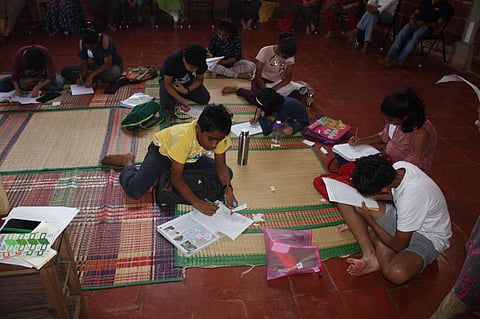

Vinay, an 11-year-old student, was afraid of solving complicated Math problems. But today, his approach to the subject has changed completely. This is probably because he attended The Elements of Study Skills workshop organised by The Teachers Collective in Bengaluru. The workshop taught students different methods of studying like visual note-taking, different ways of approaching Math problems and writing skills.
Formed in 2017 by three teachers with around 30 years of experience in the field of teaching, the trio has worked with over 400 children in Karnataka and Tamil Nadu through their workshops. While Parul Mathur and Sangitha Krishnamurthi are special educators, Anasuya Mishra is a Literature teacher. They don't have a formal office, but they work together and approach schools to offer training to students.
It all started when Sangitha realised that teachers must teach those skills that children require to study efficiently and which help them make decisions for a better future. She says, "These kind of skills are usually not taught in schools. Hence, we started teaching them through our workshops. The kind of techniques that we teach children is activity-based and is fun to learn. Initially, when we approached schools, it was difficult to make them believe in us. But with the kind of classes that we have been delivering which helps children get good results, today, schools often invite us on their own. Similarly, when we ask children the reason behind them attending our study skills workshop, they admit that their parents wanted them to attend it. We are shocked when we see the same children happily completing assignments at the end of the workshop."
The workshop takes place for five days and the first two days include a study skills session that deals with text and several theory subjects. Students are taught visual note-taking and the method of linking causes to effects. On the third day, they are taught the steps one can follow to approach a Math problem. The last two days are all about teaching children to write. They are taught the structure of writing, sentence formation and so on. The Teachers Collective also publishes the works of those children who write well on their blog.
Apart from this, they teach time management, which they think is an essential skill to possess for the future. "There are children who need their own time and space. They think that doing homework is equivalent to studying, but we tell them that's not enough. Every student needs to put in some extra time to learn lessons every day so that they don't cram it all in before the exams. Time management classes also teach children how they can plan their week, what are short-term and long-term goals, how to formulate a plan that helps them achieve their goals and more. Many kids are not aware of their goals and they don't know how to invest their time. They ask us, ‘Why should we plan when our parents are doing it for us anyway?’. We make them understand that these baby steps will help them ease the stress in the future. By the time children finish their class XII, they are very clear about what they want to do," explains Sangitha
Debating skills
Recently, the trio created a separate module to inculcate debating skills in children. In this module, children are informed that debating does not mean shouting or polarising opinions, which they watch on the news channels all the time. Sangitha believes that debates teach children negotiation skills and help them express their point of view without raising their voice. "We try to avoid controversial topics and this varies according to the age group. We don't teach them what to say or think, we teach them how to think. For instance, 10 or 11-year-old kids are given topics like, are extracurricular activities important? Do you choose your haircut or your parents choose it for you? Is homework necessary for students? What is the importance of physical education? We usually give them topics that they can relate to. I feel that it's hard to teach skills when the topics become controversial. Hence, we keep topics related to religion and politics away. At the schools, it is a seven-month programme which includes 15 sessions of debating. Teachers see tremendous changes even in introverts, as they opt to speak up during debates and gain confidence," she explains. Recently, the trio finished debating sessions for about 273 children studying in a middle school in Bengaluru and turns out, students were extremely happy to receive a platform to speak.
Financial Literacy Programme
In the coming days, the trio has plans to launch a new programme called Financial Literacy Programme for children. Under this, they will be teaching students the definition of terms like debit card, credit card, mutual funds, EMI, insurance and so on. They will also answer questions like, why one must save money? How much does a laptop or a mobile cost? How they should value money? and more.
Here are steps to approach a math problem:
I) Take a question paper and figure out the errors you have made in the problem.
II) There might be conceptual errors. For example, students might find fractions difficult.
III) In such cases, go back to basics and work on it. Once you are clear with the basics of fractions, start solving the problems in a structured way.
IV) Always read a Math problem as a story and don't look at the values or numbers. They will automatically function when you start solving the problem.
